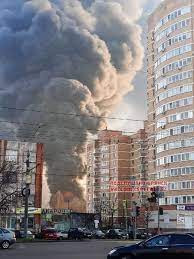Fires due to faulty wiring and poor construction are not uncommon in Russia. But four major fires in two weeks in facilities supporting the Russian Ukraine invasion?
The fires have been blamed variously on Ukrainian missiles, drones, helicopters and saboteurs. But a more intriguing possibility is emerging: that the fires are being lit by Russians opposed to the invasion or by Russian troops who do not want to be sent to Ukraine. JL
Pjotr Sauer reports in The Guardian:
Large fires broke out early on Monday at two oil depots in the Russian city of Bryansk, less than 100 miles from the border with Ukraine. Bryansk serves as a logistics base for Moscow’s military campaign in Ukraine. On Friday, 17 people were killed after a huge fire broke out at a key Russian defence research institute in Tver, north-west of Moscow. On the same day, a major chemical plant not far from Moscow caught fire.Large fires broke out early on Monday at two oil depots in the Russian city of Bryansk, less than 100 miles from the border with Ukraine, in a potential act of sabotage by Kyiv.
Russian state media said the first fire occurred at a civilian facility in Bryansk holding 10,000 tons of fuel, followed by a second fire at a military fuel depot holding 5,000 tons.
Bryansk, which is less than 100 miles north-east of the Ukrainian border, serves as a logistics base for Moscow’s military campaign in Ukraine.
Images posted on Russian social media showed columns of smoke rising from the facilities in the Russian city on Monday morning.
Military analyst Rob Lee said that the footage suggested the fire was “probably” caused by Ukrainian sabotage. “It sounds like something is flying through the air before the explosion. I think it was probably a Ukrainian attack, but we cannot be certain,” Lee said.
“The fact that it was two separate sites not far from the border is important,” Lee said, adding that the fires may have been caused by a Tochka-U tactical ballistic missile, which he said had the range to reach both targets if deployed near the Russian-Ukrainian border.
Lee added that if Ukrainian involvement was confirmed, the strikes were likely to have been conducted to “disrupt fuel supplies for the Russian military”.
In a statement on its website, the Russian emergency ministry only mentioned one of the fires, saying that a facility owned by oil pipeline company Transneft at 2am local time caught fire and there had been no need to evacuate any parts of the city of 400,000 people.
Russia’s investigative committee said in a separate statement that it had ordered an investigation into the incident. Ukrainian officials have so far not commented on the fire.
Several videos posted on social media on Monday morning appeared to show the moment of the explosion at one of the oil depots in Bryansk.
According to Baza, a Telegram news channel with links to Russian security services, the fires were caused by Ukrainian drones.
Russia has repeatedly accused Ukraine of launching strikes on its territory.
Last week, Moscow blamed Ukrainian helicopters for hitting residential buildings and injuring seven people in Bryansk. At the beginning of April, the governor of the Belgorod region, which is also close to the Ukraine border, said that two Kyiv helicopters had fired at a fuel depot there, claims Ukraine has denied. The Russian defence ministry has promised to bomb targets in Kyiv in response to what it said were “terrorist and sabotage” attacks on its territory carried out by Ukraine’s “nationalist regime”.
Russia has suffered a series of major fires at state facilities across the country in recent weeks.
On Friday, 17 people were killed after a huge fire broke out at a key Russian defence research institute in Tver, north-west of Moscow. On the same day, a major chemical plant not far from Moscow caught fire. Russia, where accidental fires are common due to dilapidated infrastructure, has blamed the fire in Tver on ageing wiring.



















0 comments:
Post a Comment